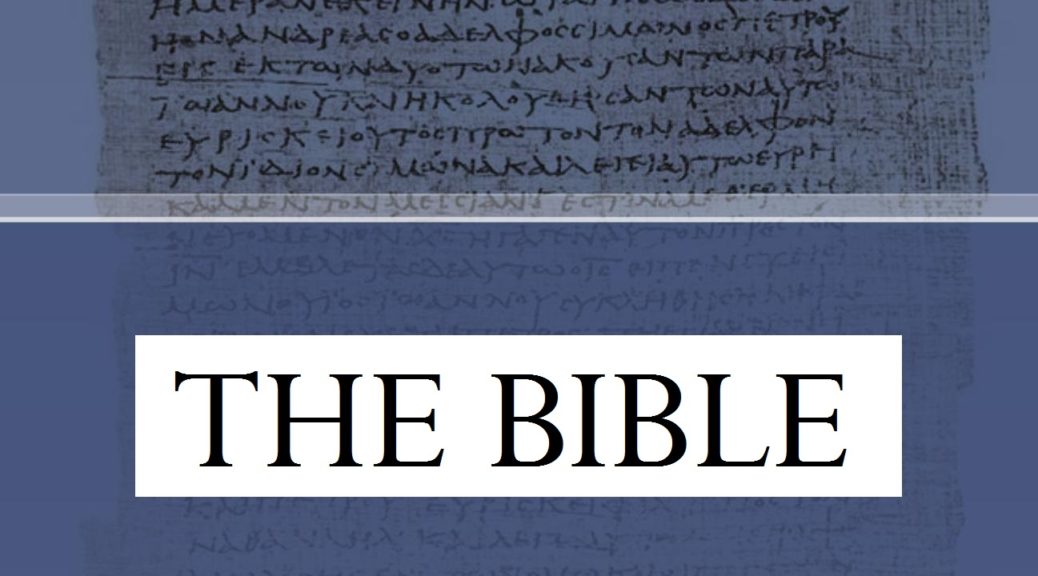di Giuseppe Guarino
Giovanni 8:58 è un testo molto importante, ma non di facile comprensione. O meglio, proprio perché non semplice, soggetto a essere mal interpretato o peggio tradotto.
Problemi dei traduttori geovisti italiani con il greco originale o con l’inglese della loro versione americana?
Il testo originale: Eἶπεν αὐτοῖς ὁ ᾿Ιησοῦς· Aμὴν ἀμὴν λέγω ὑμῖν, πρὶν ᾿Αβραὰμ γενέσθαι ἐγώ εἰμι.
La Nuova Riveduta: “Gesù disse loro: “In verità, in verità vi dico: prima che Abramo fosse nato, io sono”.
La Traduzione del Nuovo Mondo: “Gesù disse loro: Verissimamente io vi dico: Prima che Abraamo venisse all’esistenza, io ero”.
The New World Translation: “Jesus said to them: “Most truly I say to you, before Abraham came into existence, I have been.”
La TNM toglie di mezzo l’“io sono” di Gesù, in forte contrasto con “venisse all’esistenza” riferito per Abraamo, di solito considerato un’affermazione dell’eternità di Cristo, sostituendolo con un meno imbarazzante “io ero”.
Secondo Richard A. Young l’idea che l’originale “io sono” trasmette al lettore “ … è più dell’esistenza di Cristo prima di Abraamo; significa che Egli esiste eternamente” (Intermediate New Testament Greek, a linguistic and exegetical approach, pag. 166).
L’introduzione della frase di Gesù con il tipico “in verità, in verità” lascia intendere che qualcosa di più che il fatto che Gesù fosse solo più vecchio di Abraamo fosse da intendersi in quell’“io sono”.
Altri punti del vangelo di Giovanni ci propongono dei forti “io sono” seguiti da “la Luce”, “la Via”, “la Verità”, ecc., nello stesso capitolo 8, ai vv. 24 e 28. Questa caratteristica dell’evangelista è chiaramente a favore di una ulteriore ripetizione al v. 58.
Scrivendo in greco “ἐγώ εἰμι”, “egò eimì”, in italiano “io sono”, Giovanni non poteva non essere cosciente che per la Chiesa, uscita ormai dai confini della Palestina, della lingua e cultura ebraica, il raffronto fra la frase di Gesù e la traduzione greca dell’Antico Testamento di Esodo 3:14 sarebbe stato inevitabile.
Asher Intrater, nel suo libro “Chi ha pranzato con Abrahamo?” edito da Perciballi: “Aggiungendo le vocali “e”, “o”, “a” alle consonanti YHVH, si ottiene il nome YeHoVaH. In questa struttura verbale, la “e” (sh’va) indica il tempo versale futuro, la “o” (holom) il presente e la “a” (patach) il passato, dando al nome YeHoVaH il significato di “Egli sarà, Egli è, Egli era”: in altre parole, l’Eterno”, pag. 102. È quindi con un aperto riferimento a questa estraneità da vincoli temporali, che l’apostolo Giovanni parla del Signore come di “Colui che è, che era e che viene”. (Apocalisse 1:8)
L’eternità di Gesù è ribadita con altre parole nell’epistola agli Ebrei, quando ci viene detto che “Gesù Cristo è lo stesso ieri, oggi e in eterno” (Ebrei 13:8) e quindi non vi è per noi cristiani alcuno scandalo se egli rifiuta i vincoli temporali dicendo: io sono.
La reazione dei giudei sarebbe immotivata se la frase di Gesù non fosse stata per loro oltraggiosa al punto da spingerli a volerlo lapidare immediatamente, senza un ulteriore esame di quello che stesse affermando.
Vale la pena analizzare qui le motivazioni della Torre di Guardia per la sua traduzione. Chiedo al lettore di fare molta adesso molta attenzione.
La traduzione italiana TNM non è una traduzione dai testi originali o indipendente. Essa è fondamentalmente un adattamento in italiano della versione ufficiale in inglese della Torre di Guardia. Non vi sono dei traduttori italiani, perché, al contrario di come accade per tutte le altri confessioni cristiane, non vi è alcuna autonomia dei Testimoni italiani da quelli americani, dai quali dipendono.
Proprio nel caso di Giovanni 8:58, la Watch Tower americana trova delle motivazioni per rifiutare la lettura “io sono” che sono applicabili alla lingua inglese ed a quella soltanto. Infatti, l’originale inglese della TNM utilizza il verbo essere al passato prossimo (perfect indicative), mentre i traduttori italiani utilizzano il tempo imperfetto: ma nel farlo sbagliano la traduzione dall’inglese!
Leggiamo il commento alla propria versione di Giovanni 8:58 della Watch Tower americana – così come sono riportate nell’edizione del 1985 di “The Kingdom Interlinear Translation of the Greek Scriptures”: “The action expressed in John 8:58 started “before Abraham came into existence” and is still in progress. In such situation εἰμι, which is the first- person singular present indicative, is properly translated by the perfect indicative.”
La Torre di Guardia italiana traduce alla meno peggio questa affermazione – che non può contestare in quanto proveniente dal suo organo direttivo americano, ma che fondamentalmente parla di una regola grammaticale della lingua inglese, che in italiano semplicemente non esiste.
“L’azione espressa in Giovanni 8:58 iniziò “prima che Abraamo venisse all’esistenza” ed è ancora in corso. In tale contesto εἰμι (eimì), prima persona singolare del presente indicativo, si può correttamente tradurre con un tempo passato come l’imperfetto indicativo o il passato prossimo”.
Mi chiedo: è possibile che fra i Testimoni di Geova italiani nessuno conosca l’inglese a sufficienza da accorgersi di questa incongruenza?
Intanto in italiano il testo dice: “si può correttamente tradurre con un tempo passato come l’imperfetto indicativo o il passato prossimo” ma l’inglese non parla di imperfetto indicativo, bensì di passato prossimo (perfect) perché in inglese 1. Non esiste l’imperfetto e 2. In inglese il tempo del verbo che descrive delle azioni che cominciano nel passato e che sono tutt’ora in corso, è soltanto il perfect indicative – che corrisponde al nostro passato prossimo.
Ma c’è qualcosa di più ovvio. In italiano le azioni che cominciano nel passato e proseguono nel presente non si esprimono né con l’imperfetto né con il passato prossimo, bensì col tempo presente. Esempio: “Io vivo in Italia dal 1974”. Se avessimo utilizzato passato prossimo o imperfetto, avremmo ottenuto tutt’altro significato: 1. Imperfetto: “Io vivevo in Italia dal 1974”, 2. “Ho vissuto in Italia dal 1974”.
L’espressione: “io vivo in Italia dal 1974” si traduce in inglese “I have lived in Italy since 1974”. Il presente deve essere tradotto con un present perfect.
Allo stesso modo un’espressione inglese del tipo: “I have lived in England since 1974”, si deve tradurre: “vivo in Inghilterra dal 1974”. Perché quando un’azione comincia nel passato ed è ancora in essere, in inglese si deve utilizzare il perfect (passato prossimo), ma in italiano il presente!
Quindi la traduzione inglese dei Testimoni che dice: “before Abraham came into existence, I have been”, se origina dal fatto che il perfect descrive in inglese un’azione cominciata nel passato e tutt’ora in essere, deve tradursi con un tempo presente italiano: “prima che Abraamo venisse all’esistenza, io sono”.
Stavolta per appurare l’accuratezza della versione dei Testimoni di Geova basterà consultare un insegnante di inglese.





